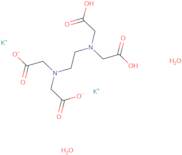Ethylenediaminetetraacetic acid dipotassium salt dihydrate
CAS: 25102-12-9
Ref. 3D-ABA10212
| 1kg | Descatalogado | ||
| 5kg | Descatalogado | ||
| 100g | Descatalogado | ||
| 250g | Descatalogado | ||
| 500g | Descatalogado |
Información del producto
- Edta-2K• 2H20
- 2K
- EDTA, Dipotassium Salt
- Ethylenediaminetetraacetic acid, dipotassium salt
- Ethylenediaminetetraacetic acid, dipotassium salt dihydrate
- Ethylenediamine-N,N,N',N'-tetraacetic acid, dipotassium salt, dihydrate
- Edta-2K・2H20
- Acetate, 2,2',2'',2'''-(1,2-Ethanediyldinitrilo)Tetrakis-, Potassium Salt (1:2)
- Ethylenedinitrilotetraacetic acid dipotassium salt dihydrate
Ethylenediaminetetraacetic acid dipotassium salt dihydrate (EDTA) is a water treatment agent that binds to metal ions and inhibits the polymerase chain reaction. It is most commonly used in wastewater treatment, particularly for the removal of magnesium oxide. EDTA has been shown to be an anticoagulant in plasma samples, which may be due to its ability to bind to ferritin, a protein involved in the storage and release of iron. The binding of EDTA with ferritin prevents the release of iron, leading to decreased levels of thrombocytes and therefore less blood coagulation. The use of EDTA as a diagnostic agent in positron emission tomography imaging has also been proposed. This compound has been shown to have strong binding properties with deionized water, which causes it to form a stable complex with high surface area. This property allows it to be used as an adsorbent for Langmuir adsorption is





